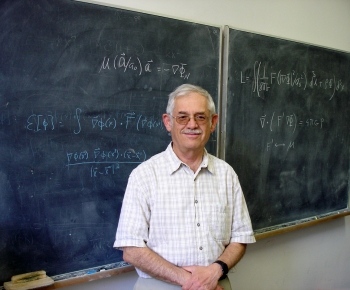| | 03 September, 2012
| | Top physicists gather in Jerusalem to mark 40 years since Jacob Bekenstein’s famous essay on the entropy of black holes | | Speakers include Nobel laureate and winner of new $3 million physics prize |
 | | Prof. Jacob Bekenstein |
|
As the scientific community marks 40 years since the publication of Prof. Jacob Bekenstein's famous paper on black hole entropy, the Hebrew University of Jerusalem’s Institute for Advanced Studies is celebrating the occasion by hosting an international conference featuring the world’s top theoretical physicists. The Sep. 3-7 conference, Forty Years of Black Hole Thermodynamics, is presented in cooperation with the Israel Science Foundation and will focus on recent ramifications of black hole thermodynamics and prospects for the future.
Bekenstein’s groundbreaking proposals about black holes, entropy and thermodynamics were originally contested by renowned physicist Stephen Hawking, who later admitted that Bekenstein was correct and affirmed Bekenstein's ideas with his famous proposal for the existence of Hawking radiation.
In 2012, Bekenstein — the Polak Professor of Theoretical Physics at the Hebrew University's Racah Institute of Physics — received the Wolf Prize for his groundbreaking work, prompting Hebrew University President Prof. Menahem Ben-Sasson to declare that his ''original and innovative work has earned him a place of honor in the field of exploration of the universe, and has paved the way for many other scientists around the world.'' Over a third of Wolf Prize winners have gone on to win a Nobel Prize.
Speakers at the conference include Gerard ‘t Hooft of Utrecht University, recipient of the 1999 Nobel Prize in physics for work in electroweak interactions, discussing Superstrings and Hidden Variables; and Juan Maldacena of Princeton’s Institute for Advanced Study, discussing The Black Hole Information Problem.
Malcadena is among the first group of winners of the Fundamental Physics Prize, a US$3 million annual award launched this year by the Milner Foundation. Awarded for scientific breakthroughs, the award is intended to advance knowledge of the universe and to communicate the excitement of fundamental physics to the public. The inaugural nine recipients, who received US$27 million in aggregate, agreed to form a selection committee to award future prizes.
Conference Chair Professor Barak Kol said, ''The achievements of Jacob Bekenstein bring honor to the Hebrew University and to Israel, and give Israeli researchers inspiration to continue their work in the field.''
All lectures will take place at the Feldman Building, on the Edmond J. Safra campus.
A full conference agenda is available at http://bit.ly/hu_ias12.
|
|


